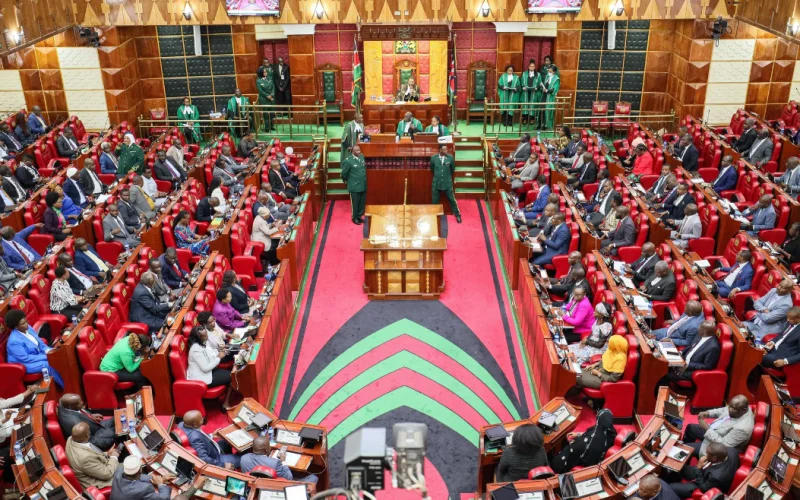Azimio MPs schedule meeting to strategize ways to stop Finance Bill 2024
By Collins Amanga, June 16, 2024
Members of Parliament from the Azimio la Umoja coalition are scheduled to meet on Tuesday, June 18, 2024, to devise strategies to oppose the Finance Bill 2024.
The meeting, announced by Homa Bay Town MP Peter Kaluma via his X account, will be mandatory for all Azimio MPs and is set to start at 5:00 p.m.
Call on Azimio MPs
Kaluma emphasized the importance of this meeting, stating, “Fighting for the people is our sacred duty.”

PHOTO/John Ochieng
He called on all Azimio MPs to participate in the deliberations aimed at defeating the proposed bill.
“Azimio MPs to hold mandatory meeting on Tuesday, 18th June 2024, at 5 pm to deliberate on and come up with strategies to defeat the Finance Bill 2024. Fighting for the people is our sacred duty,” Kaluma announced.
The Finance Bill 2024 introduces several significant changes to both business and personal tax regulations.
For businesses, the definition of digital content monetization has been broadened to include various forms of creative works and material sharing, making these activities taxable under the Income Tax Act.
Additionally, donations are now clearly defined to include both cash and in-kind contributions, allowing them to be deductible for income tax purposes.
The concept of a “public entity” has been clarified to encompass various government bodies and agencies, and a unified definition of “related party” has been established, focusing on direct or indirect control over another business.
The scope of royalty payments has been expanded to include any software-related fees, with withholding tax set at 3% for residents and 5% for non-residents.
The previous threshold for withholding tax on services has been removed, and the daily penalty for late returns by export processing zone enterprises has been eliminated.
The carryforward period for foreign exchange losses has been reduced to three years for specific entities.
Several income tax exemptions have been repealed, including those for amateur sporting associations, registered trust schemes, and certain bonds.
A new motor vehicle tax at 2.5%, with a specified range, will be collected by insurers. Telecommunications operators can now claim a 10% annual investment allowance on spectrum licenses. Any change in accounting periods must be approved by the Kenya Revenue Authority within six months.
The preferential tax rate for companies building 100 residential units annually has been repealed, and the tax rate for nonresident ship and air transport operators has been increased to 3%.
In the digital space, the definition of the digital marketplace now includes ride-hailing, food delivery, freelance services, and more.
Withholding tax on digital content and marketplace income is set at 5% for residents and 20% for non-residents.
The Digital Services Tax is being replaced by a Significant Economic Presence tax for non-residents with substantial digital engagement in Kenya.
Personal Tax Changes
Personal tax changes include the elimination of outdated definitions related to a wife’s employment income. The requirement for retirement schemes to register with the Kenya Revenue Authority has been removed, leaving only registration with the Retirement Benefits Authority.
Allowable pension contributions have been increased, and tax-exempt per diem benefits have been revised. The limit on non-cash benefits has been raised, and the exempt value of meal benefits has been increased.

Public officers will now have their reimbursements exempt from income tax. Additional personal tax adjustments include the designation of contributions to the Social Health Insurance Fund, affordable housing levy, and post-retirement medical fund as deductible.
However, tax reliefs for these contributions have been repealed.
The allowable mortgage interest deduction has been increased, and specific pension benefits are now exempt under defined conditions.
Remote workers for Kenyan employers must have a Kenya Revenue Authority PIN, and PAYE compliance dates now exclude weekends and public holidays.
Internationally, the bill introduces a minimum top-up tax for entities in multinational groups with a turnover of €750 million (Ksh103 trillion) or more, ensuring an effective tax rate of at least 15%.

An Advance Pricing Agreement regime has been introduced for related party transactions, valid for up to five years. A capital gains tax rate of 5% is proposed for firms certified by the Nairobi International Financial Centre Authority, subject to certain investment criteria.
For Value Added Tax (VAT), the time of supply for exported goods is now defined as the point when required export documents are confirmed. The right to offset withholding VAT credits against other taxes has been removed, and the 24-month limit for VAT refund applications has been eliminated. Several products will see changes in their VAT status, moving from exempt to taxable.
For these and more credible stories, join our revamped Telegram and WhatsApp channels.
Telegram: https://t.me/peopledailydigital
WhatsApp: https://whatsapp.com/channel/0029Va698juDOQIToHyu1p2z